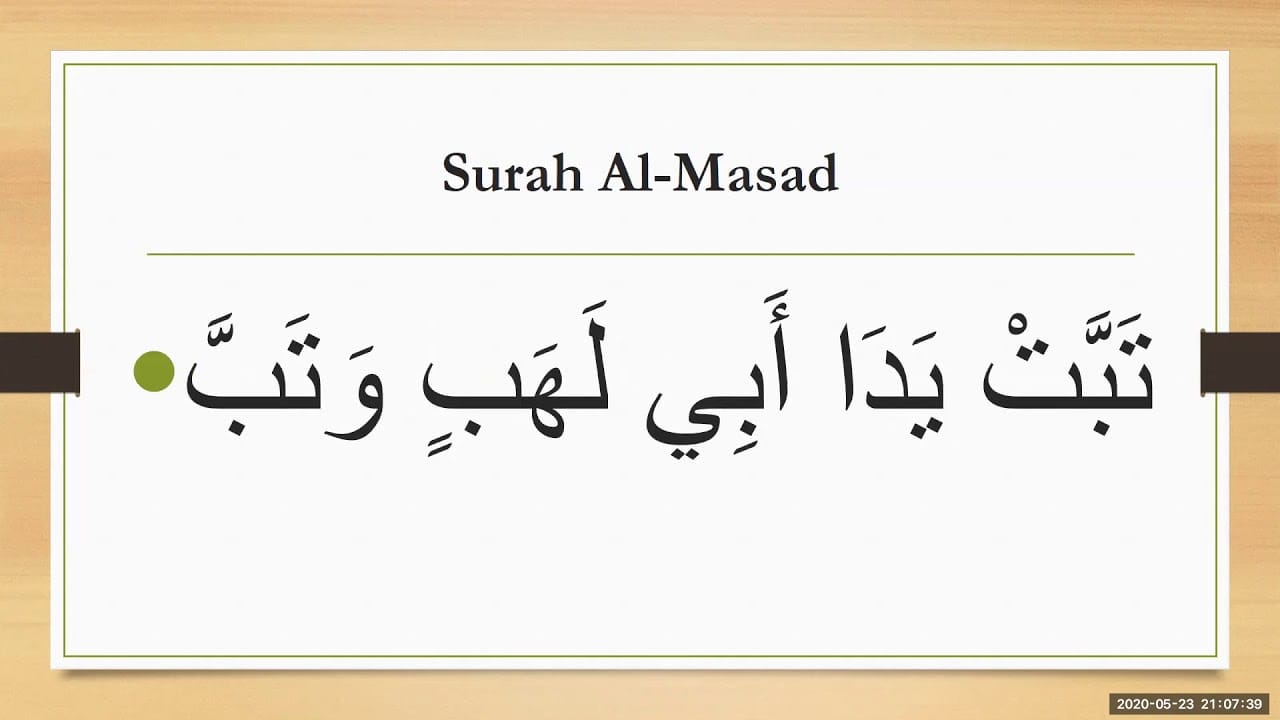Understanding Surah Al Masad with Hekma Academy
Learning Surah Al Masad Transliteration will help you as a Muslim, so let’s discover this surah. Surah Al Masad is the 111th chapter of the Holy Quran, consisting of five verses. This Surah, also known as “The Palm Fiber” or “The Flame,” delivers a powerful message about the consequences of opposing the Prophet Muhammad (PBUH) and rejecting the truth. It specifically addresses the fate of Abu Lahab and his wife, who were staunch enemies of Islam. This article provides a comprehensive understanding of Surah Al Masad through its transliteration, English translation, and detailed explanations.
Background of Surah Al Masad
Surah Al Masad was revealed in Mecca and is unique in its direct condemnation of Abu Lahab, the Prophet’s (PBUH) uncle, and his wife. Their hostility towards the Prophet and their active efforts to undermine his mission are well-documented in Islamic history. This Surah serves as a reminder of the consequences of such opposition.
Benefits of Reciting Surah Al Masad
Reciting Surah Al Masad brings several benefits to believers:
- Spiritual Benefits: It reinforces the belief in divine justice and the consequences of wrongdoing.
- Psychological Benefits: Reflecting on this Surah can provide comfort and reassurance that justice will prevail.
Surah Al Masad Transliteration
بسم الله الرحمن الرحيم
تَبَّتۡ يَدَآ أَبِي لَهَبٖ وَتَبَّ مَآ أَغۡنَىٰ عَنۡهُ مَالُهُۥ وَمَا كَسَبَ سَيَصۡلَىٰ نَارٗا ذَاتَ لَهَبٖ وَٱمۡرَأَتُهُۥ حَمَّالَةَ ٱلۡحَطَبِ فِي جِيدِهَا حَبۡلٞ مِّن مَّسَدِۭ
For non-Arabic speakers, correct pronunciation is crucial. Here is the transliteration of Surah Al Masad to assist in proper recitation:
- Bismillahir Rahmanir Raheem
- Tabbat yada abi lahabiw watabb
- Ma aghna ‘anhu maluhu wama kasab
- Sayasla naran thata lahab
- Wamra’atuhu hammalata al-hatab
- Fee jeediha hablum mim masad
Surah Al Masad English Translation
To understand the message of Surah Al Masad, here is the English translation:
- Perish the two hands of Abû Lahab (an uncle of the Prophet) and perish he.
- His wealth and his children will not benefit him!
- He will be burnt in a Fire of blazing flames!
- And his wife, too, who carries wood (thorns of Sa‘dân which she used to put on the way of the Prophet (PBUH), or use to slander him).
- In her neck is a twisted rope of Masad (palm fiber).
Key Themes in Surah Al Masad
Surah Al Masad encompasses several key themes:
- Condemnation of Opposition: The Surah explicitly condemns those who oppose and mock the Prophet Muhammad (PBUH).
- Divine Justice: It serves as a reminder of the inevitability of divine justice and the fate of wrongdoers.
Detailed Explanation of Each Verse
Verse 1: The Fate of Abu Lahab
Perish the two hands of Abû Lahab (an uncle of the Prophet) and perish he.
This verse pronounces the downfall of Abu Lahab, symbolizing his complete loss and destruction due to his opposition to Islam.
Verse 2: The Consequences of His Wealth
His wealth and his children will not benefit him!
This verse emphasizes that Abu Lahab’s wealth and status will be of no benefit to him in the Hereafter.
Verse 3: The Nature of His Punishment
He will be burnt in a Fire of blazing flames!
Abu Lahab is warned of the severe punishment that awaits him in the form of a blazing fire.
Verse 4: The Fate of His Wife
And his wife, too, who carries wood (thorns of Sa‘dân which she used to put on the way of the Prophet صلى الله عليه وسلم, or use to slander him).
Abu Lahab’s wife, who played a significant role in supporting her husband’s antagonism, is also condemned.
Verse 5: The Symbolic Punishment
In her neck is a twisted rope of Masad (palm fiber).
This verse symbolizes the punishment for Abu Lahab’s wife, highlighting her role in spreading harm and her ultimate disgrace.
Historical Context and Significance
Surah Al Masad was revealed during a period when Abu Lahab and his wife were actively opposing the Prophet Muhammad (PBUH). Their actions included mockery, spreading false information, and attempting to harm the Prophet and his followers. The Surah serves as a divine response to their hostility and a warning to others.
Comparative Analysis with Other Surahs
While many Surahs address the consequences of disbelief and opposition to Islam, Surah Al Masad uniquely singles out specific individuals, demonstrating the personal nature of divine justice.
Reflections and Lessons
Reflecting on Surah Al Masad can inspire believers to stay firm in their faith, trust in divine justice, and avoid actions that lead to such severe consequences.
How to Incorporate Surah Al Masad into Daily Life
- Daily Recitation: Incorporate the recitation of Surah Al Masad into your daily prayers and reflections.
- Practical Applications: Use the Surah as a reminder to uphold justice, truth, and steadfastness in the face of opposition.
Common Misconceptions about Surah Al Masad
There are various misconceptions about Surah Al Masad. It is important to understand that the Surah is not just about personal vendettas but emphasizes broader themes of justice and accountability.
Learning and Teaching Surah Al Masad
- Methods for Memorization: Practice reciting the Surah regularly and use repetition to aid memorization.
- Teaching Strategies: Use historical context and storytelling to make Surah’s message more relatable for learners.
Resources for Further Study
For those interested in delving deeper into Surah Al Masad, here are some recommended resources:
- Books: “Tafsir Ibn Kathir” and “The Study Quran”
- Courses: Online Quran courses that offer in-depth study of Surahs with Hekma Academy
Surah Al Masad is a powerful reminder of the consequences of opposing the truth and the inevitability of divine justice. By understanding its meaning and incorporating its teachings into our daily lives, we can strengthen our faith and find comfort in its message. Hekma Academy provides valuable resources to help deepen our understanding and appreciation of this significant Surah.
FAQs
- What is the main message of Surah Al Masad?
- The main message is about divine justice and the consequences of opposing the Prophet Muhammad (PBUH).
- How can I memorize Surah Al Masad?
- Practice reciting it regularly, break it down into smaller parts, and use repetition.
- What are the benefits of reciting Surah Al Masad?
- It reinforces the belief in divine justice and provides comfort that wrongdoers will be held accountable.
- Can Surah Al Masad be recited during prayer?
- Yes, it can be recited during prayer and is often included in daily recitations.
- Where can I learn more about Surah Al Masad?
- You can refer to resources like “Tafsir Ibn Kathir,” and online platforms like Hekma Academy, for detailed study and explanations.
Read More: Surah Al Kawthar Transliteration and English Translation






